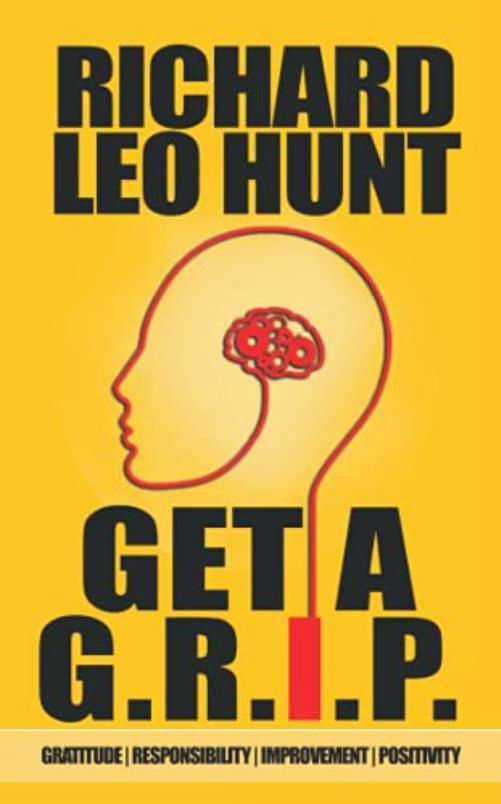Book review: ‘Get a G.R.I.P.’
Published 12:00 am Sunday, July 4, 2021

- BOOK REVIEW
“Get a G.R.I.P.: Gratitude, Responsibility, Improvement & Positivity” by Richard Leo Hunt. Bowling Green: Farah Evers Designs, 2021. 144 pages, $12.99 (paperback).
“There will be times when we experience events, circumstances, relationships, etc., that are adverse and require a serious consideration of the potential negative consequences, exploration of risks and realistic analysis of the situation,” Richard Leo Hunt explains near the beginning of “Get a G.R.I.P.: Gratitude, Responsibility, Improvement & Positivity,” his recently released roadmap on how to successfully navigate the increasingly challenging personal and professional landscape most of us encounter on a daily basis.
“However, it is important to neither dwell nor ruminate on the negative aspects for an extended time,” he continues. “If I find myself floundering in worry, I quickly find something for which to be thankful and express my gratitude mentally, verbally or in writing. A state of gratitude sets me more at ease and helps me focus more on outcomes that I desire. Gratitude brings a good feeling that proliferates more of the same way of thinking and behavior. With gratitude as a foundation, I can generally reframe any circumstance, event or relationship in a positive way.”
So begins one of the more inspirational and self-reflective literary journeys I have had occasion to peruse in recent memory. Hunt has the ability to integrate the profound with the seemingly mundane in a way that eludes many authors exploring the same terrain. It is obvious he is very comfortable with the subject matter he is dissecting; it is equally apparent he is pouring his own personal experiences – both good and bad – into his work. The portrait he is meticulously constructing is detailed and visceral. His prose captures your imagination on many levels: cognitive, emotional and especially behavioral. At the end of the day, this is a book about finding the proverbial “better way.”
“Get a G.R.I.P.” consists of an introduction, four chapters devoted to each of the four major themes of the narrative, and a summary that I found notably helpful. Hunt’s writing style is fluid and conversational; he is not talking “to” the reader, he is engaging his audience on a very personal level. Honestly, when I met the author at a local coffee shop to get a copy of the book and find out more about this intriguing project, our discussion mirrored the discourse I encountered when I started reading the manuscript. Who he is literally jumps off of every page; by the time you finish this eloquent little primer, you feel like you’ve been friends with the guy your entire life.
Hunt has three degrees from Western Kentucky University: a BS in chemistry, an MS in engineering technology management, and an EdD in organizational leadership. His dissertation, “Overcoming Failure – Characteristics of Leaders Who Have Successfully Recovered from a Significant Setback,” investigated how those in positions of responsibility react to failure and how resilience manifests itself through coping and adaptational mechanisms. A U.S. Army veteran who served on active duty from 1989 through 1995, he has owned a business, taught at the collegiate level, done public speaking and held quality management positions in several industries. His is also an actor with several credits to his name; you can read more about him at his website: www.richard leohunt.com.
“Get a G.R.I.P.” succeeds, at least in part, from Hunt’s recognition of the universality of human experience combined with an astute and reassuring belief in the resilience of individuals to alter their destiny by carefully and accurately deciphering what constitutes the obstacles they repeatedly encounter and making a conscious decision to move in a more constructive direction. This insight is on display throughout the text; a good example can be found in “Responsibility,” the second chapter and one I found particularly poignant.
“What if we fail despite good intentions?” Hunt asks in his typically direct and to-the-point manner. “A failure can result from errors in judgment and decision-making. These errors are sometimes rooted in systematic ways of thinking that vary, stemming from logical and rational thought processes. Such systematic deviations in thought are referred to as cognitive biases which are narrow ways of thinking about options, objectives, and our future.
“These biases can unknowingly lead to a tendency to be in favor of or against something or someone, especially when we are emotionally invested,” he continues. “The implication is that we are generally unaware of our cognitive biases and that we have good intentions. We can experience failure due to poor decision-making that is ultimately rooted in one or more cognitive biases.”
Hunt then goes on to define the five different types of cognitive biases and how each can derail our lives on both a microcosmic and – if left unchecked – a macrocosmic level: confirmation bias, fundamental attribution errors, normalization of deviance, outcome bias and overconfidence bias. If you want to know more about how these cognitive biases are interfering with achieving your professional, relationship and life goals, information on how to get your own copy of “Get a G.R.I.P.” can be found at the conclusion of this review.
As you may have surmised, I enjoyed this one immensely. Very few books have the ability – in and of themselves – to leave me in a noticeably better frame of mind once I have finished them. This one did exactly that.
“Our beliefs about our capabilities, or self-efficacy, are central to exercising control over a situation and function as important determinants of thoughts, feelings, and behaviors,” Hunt asserts near the end of his journey through the human psyche. “Believe in yourself! Believe in your abilities, how much effort you will exert toward your goal, and the amount of stress, anxiety, or depression you will experience when taking action to pursue your goals.”
I could not have said it better myself. Highly recommended. “Get a G.R.I.P.” is available at Amazon.com.
– Reviewed by Aaron W. Hughey, University Distinguished Professor, Department of Counseling and Student Affairs, Western Kentucky University.






